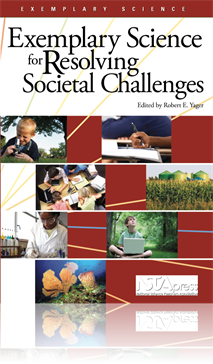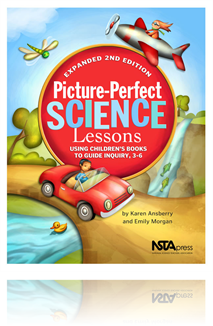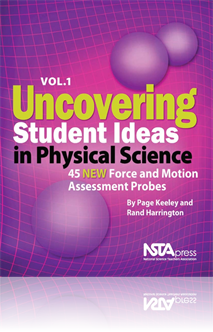All Book Chapters
Book Chapter
Communic–Able: Writing to Learn About Emerging Diseases
High school students in a seven-week writing-intensive project at the University of Wisconsin School of Medicine and Public Health serve as research apprentices. This project focuses on students in need of additional development in communication, com...
Book Chapter
Earth Hounds: Dr. Xargle's Book of Earth Hounds and Seven Blind Mice
Learners develop understandings of the differences between observations and inferences by analyzing Dr. Xargle's comical, yet misguided, attempts to teach his students about human babies. Learners then make observations and inferences of "mystery sam...
Book Chapter
The purpose of this assessment probe is to comprehensively elicit students' ideas about the relationship between force and motion. The list of possible answers includes several distracters that are based on learning research; thus the probe will tell...
Book Chapter
The purpose of this assessment probe is to elicit students' description of the motion of an object. The probe uses the context of rolling down and up a hill to determine if students recognize when an object speeds up or slows down or does neither—m...
Book Chapter
The purpose of this assessment probe is to determine what students mean when they use words to describe motion, such as speed, velocity, and acceleration. The probe is designed to reveal students' initial meaning of the word velocity before formally ...
Book Chapter
The purpose of this assessment probe is to elicit students' meaning of words used to describe motion such as speed, velocity, and acceleration. The probe is designed to reveal students' initial qualitative meaning of the word acceleration before form...
Book Chapter
The purpose of this assessment probe is to elicit students' ideas about motion using marbles and ramps. The probe is designed to reveal students' thinking about the factors that affect the time it takes for a marble to roll down a ramp....
Book Chapter
The purpose of this assessment probe is to elicit beginning ideas about force. The probe is designed to reveal whether students generally identify forces as pushes and pulls....
Book Chapter
The purpose of this assessment probe is to elicit beginning ideas about types of forces. The probe is designed to reveal whether students recognize that forces can act both in direct contact with an object and at a distance....
Book Chapter
The purpose of this probe is to examine students' ideas about an imaginary frictionless environment. The probe is designed to reveal students' ideas about the effect of friction on motion....
Book Chapter
The purpose of this assessment probe is to elicit students' ideas related to force, energy, and motion. The probe is designed to identify students who may think about force as being carried by an object, rather than as being an interaction between ob...
Book Chapter
The purpose of this probe is to elicit students' ideas about relative motion. The probe is designed to reveal whether students use Newton's first law of motion to predict where a person would land on a moving object if he or she jumped straight up wh...
Book Chapter
This probe is designed to elicit students' ideas about changing the direction of motion in the absence of air. Many students will have seen movies or television shows in which spaceships turn by banking or using wing flaps. In outer space, where ther...
Book Chapter
The purpose of this assessment probe is to elicit students' ideas about force related to the interaction between inanimate objects. The probe is designed to determine which forces students think act on an object at rest when it is inside a fast-movin...
Book Chapter
The purpose of this assessment probe is to elicit students' ideas about Newton's first law in the context of circular motion. The probe is designed to determine whether students recognize that an object will move in a straight line unless acted on by...
Book Chapter
The purpose of this assessment probe is to elicit students' ideas about falling objects. The probe is designed to find out whether students recognize the role of mass and forces in understanding why heavy and light objects can fall at the same rate....
Book Chapter
The purpose of this assessment probe is to elicit students' ideas about forces. The probe is designed to reveal whether students recognize a situation in which the force applied by one object on another is equal, but opposite, to the force applied by...
Book Chapter
The purpose of this assessment probe is to elicit students' ideas about pairs of forces that fit Newton's third law. The probe is specifically designed to reveal whether students can identify third law force pairs as involving different objects. The ...
Book Chapter
The purpose of this assessment probe is to identify how students interpret a motion diagram and whether they have an operational understanding of the concept of speed. The probe is designed to show whether students can interpret the intervals (i.e., ...
Book Chapter
The purpose of this assessment probe is to elicit students' ideas about circular motion and forces. The probe is designed to reveal whether students understand that turning requires a force toward the center of the curve....
Book Chapter
The purpose of this assessment probe is to elicit students' ideas about weight and mass when a property of an object changes. The probe is especially designed to determine whether students recognize that although weight and mass are different, both t...
Book Chapter
What Will Happen to the Weight?
The purpose of this assessment probe is to elicit students' ideas about weight. The probe is designed to determine whether students recognize that the gravitational force on an object, and thus its weight, is the same whether an object is floating in...
Book Chapter
The purpose of this assessment probe is to elicit students' ideas about gravity. The probe is designed to reveal whether students recognize that gravitational force is universal and that it works on every object in the universe regardless of what the...
Book Chapter
The purpose of this assessment probe is to elicit students' ideas about how objects with different masses (or weights) behave in free fall where air resistance is negligible. The probe shows whether students can relate their beliefs about how objects...
Book Chapter
The purpose of this assessment probe is to elicit students' ideas about gravity. The probe is designed to reveal whether students recognize that objects closer to the center of Earth's mass experience the greatest gravitational force. The probe also ...
Book Chapter
The purpose of this assessment probe is to elicit students' ideas about Earth's gravity. The probe is designed as a thought experiment to determine whether students recognize that Earth's gravity pulls falling objects toward its center....
Book Chapter
The purpose of this assessment probe is to elicit students' ideas about pulleys. The probe is specifically designed to find out whether students think the size of a pulley has an effect on how much easier it is to lift an object (mechanical advantage...
Book Chapter
The purpose of the assessment probe is to determine whether students can translate a motion diagram into a graph—a position versus time graph—to represent the motion of a moving object....
Book Chapter
The purpose of this assessment probe is to elicit students' ideas related to pulleys and mechanical advantage. The probe is specifically designed to investigate student intuition about tension, which is another name for the force exerted by ropes or ...
Book Chapter
The purpose of this assessment probe is to elicit students' ideas about center of mass. The probe is specifically designed to see if students recognize that when an object is balanced on a fulcrum, it does not mean that the parts on either side of th...
Book Chapter
The purpose of this assessment probe is to elicit students' ideas about balancing. The probe is specifically designed to see if students recognize that objects with different weights (or masses) can be balanced using a simple mathematical rule....
Book Chapter
The purpose of this assessment probe is to elicit students' ideas about levers and fulcrums. The probe is specifically designed to determine whether students can differentiate between the concept of force and the concept of energy in the context of l...
Book Chapter
The purpose of this assessment probe is to elicit students' ideas about gears. The probe is specifically designed to determine whether students use the concept of gear ratios....
Book Chapter
One of the primary difficulties that students experience in determining the speed of a moving object is differentiating between quantities and changes in quantities. The purpose of this probe is to examine students' use of ratios that express displac...
Book Chapter
The purpose of this assessment probe is to determine whether students recognize that there is a variety of measurement units, described as ratios, that can be used to express average speed, even though some units may not be practical for the situatio...
Book Chapter
The purpose of this assessment probe is to elicit students' ideas about gravity. The probe is designed to reveal whether students recognize that gravitational force is a pull by the Earth, toward the Earth, regardless of whether an object is falling ...
Book Chapter
The purpose of this assessment probe is to elicit students' ideas about pendulums. The probe is specifically designed to find out what variables students think affect the time it takes a pendulum to swing back and forth. In addition, if students have...
Book Chapter
The purpose of this assessment probe is to see whether students recognize that units of distance traveled must be measured with a measurement device from the starting point to the ending point. The probe reveals whether students take into account the...
Book Chapter
The purpose of this probe is to examine how students interpret a graphical representation of motion. The probe is designed to reveal whether students interpret a motion graph pictorially or mathematically....
Book Chapter
The purpose of this assessment probe is to elicit students' ideas about comparing motions. The probe is designed to see if students differentiate between the concept of position and the concept of speed. The probe will also help to see if students un...





